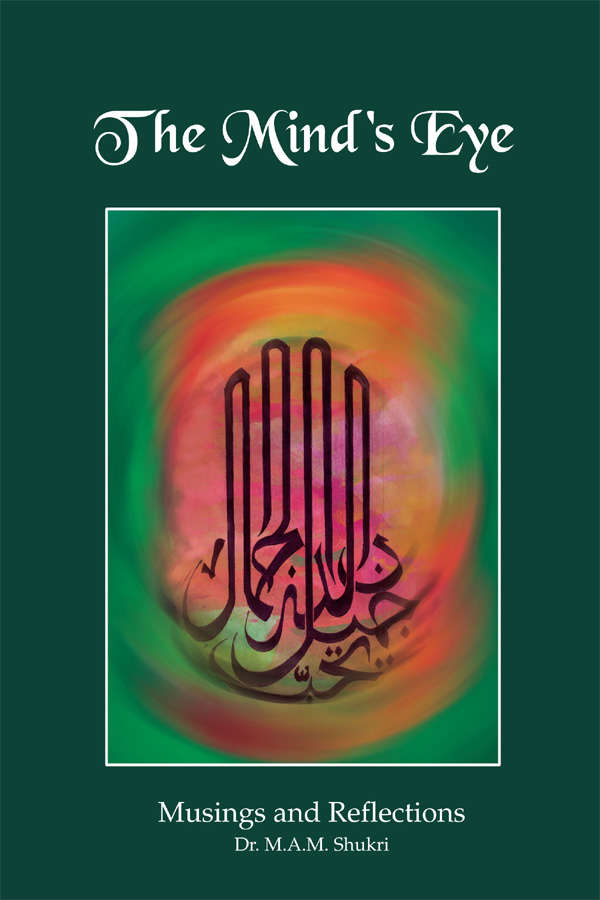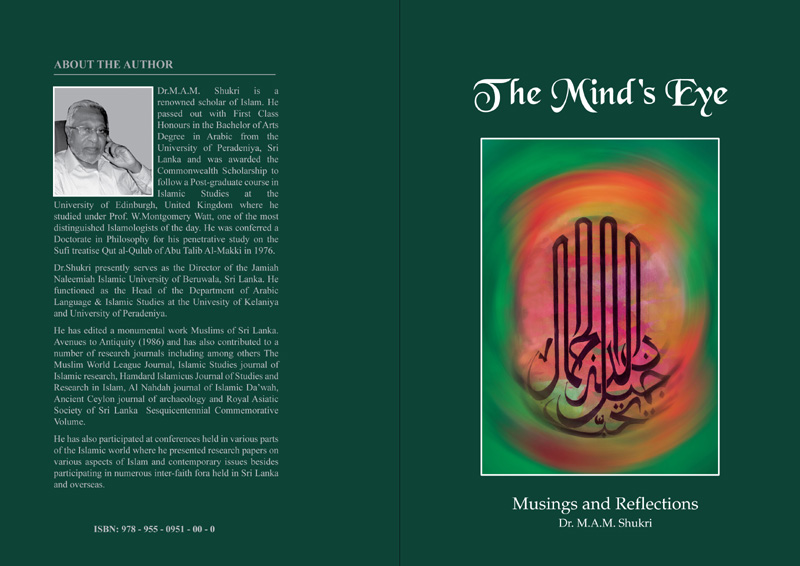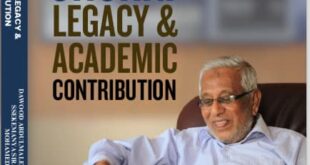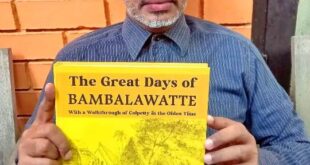It is with immense pleasure that I pen these thoughts to this valuable collection of essays by Dr.M.A.M.Shukri on various aspects of Islam which were published in learned journals throughout a good part of his distinguished academic career.
Dr.Shukri majored in Islamic Philosophy for which he received his PhD from the University of Edinburgh and the writings gathered in this volume reflect his thinking on a range of issues from the deeply profound to the seemingly mundane ranging from Ethical System in Islam and Understanding History from an Islamic Perspective to Human rights in Islam, Muslim Contribution to Science and Civilization and Islamic Perspectives on Archaeology and Aspects of Islamic Art. What is particularly intriguing about Dr.Shukri’s writings is his firm grasp of the subjects he has dealt with, imparting to these observations not only a wider dimension but also an inner meaning meant to appeal to the deeper recesses of the human soul leaving one contemplating on the real purpose of this worldly life and indeed on the many dimensions of the human experience.
Consider for instance the insight he gives us in his contribution on an apparently simple topic such as Islamic Perspectives in Archaeology:
An intellectual apprehension of the great civilizations brought to light by the archaeologist’s spade and a meditative contemplation of the mute silence to which every one of them have been reduced by TIME is germane to the Islamic vision of things and we should say, is in harmony with all religious truths. The archaeological portrayal of the rise and fall of all civilizations drive home the philosophic truth, that man and the universe in which he finds himself is destined to perish. No power, no wealth, no heroism and deeds of valour, no noon-day genius can save him from the inexorable juggernaut of death.”Kullu Nafsin Dhaykatul Maut” – Every soul shall taste death. Shelley’s poem on Ozymandias delineates this Quranic truth movingly:¬”I am Ozymendias, king of kings: Look on my works, ye mighty, and despair; Nothing beside remains. Round the decay of that colossal wreck, boundless bare, The lone and level sands stretch far away”. Archaeology enters the Islamic perspective, as it calls upon man to travel and see for himself the fate of those who preceded us: “Do they not travel through the earth and see what was the end of those before them? They were more numerous than those, and mightier in power and in the trace they left in the earth.” Al-Qur’an. ch. 40:82. This also further affirms the futility of human struggle for wealth, power and glory as the Qur’an points out elsewhere. Despite the liveliness of the past civilizations and their realistic portrayal by archaeologist from the desultory fragments they have left behind, the world, as all religions are agreed is a reverie -“Men are asleep, when they die they awake.” – The Prophet
This illusion as maya, of terrestrial existence has been over-accentuated by some philosophies resulting in a disequilibrium of perspective. With a similitude which is touching, the Qur’an defies as it were, the empiricist’s certitude of the material permanence of the world when it says: ‘Thou thinkest the mountains are firm; nay, they will pass away like the passing clouds.”
In effect, he sums up the Islamic view of history in a way that is both touching and moving. Man is often so lost in the ways of the world that he hardly stops to reflect on the perishable nature of his existence. How short life indeed is, if we ever stop to think of it. A lifespan of even a hundred years is really not much if we really think about it. A year is only 360 days after all. And man in his folly craves for transient power, wealth and other worldly pleasures as if he is going to enjoy them eternally. He risks his life and health and those of others lusting after these ephemeral pleasures, only to find that it was really not worth after all. This is where religion can guide man and show him the path he needs to pursue for peace of mind and for the betterment of human society as a whole.
Dr.Shukri also gives us some valuable insights into the relationship between man and nature in his well presented essay on the Ethical System of Islam where he observes:
The Quran refers to nature, its charms and beauties, as a manifestation of Allah’s Glory, and Muslims are asked to look upon nature as an intimate wit¬ness to the Divine Presence. Thus, Islamic ethics and moral¬ity were not only concerned about the relationship between man and God, between man and man, but also between man and nature: By refusing to separate man and nature, Islam presents an integrated view of the universe and sees in cosmic and natural order the flow of divine grace and blessing. In¬spired by this ethical approach to nature Muslims made na¬ture, an object study, which finally integrated man with his own prototype and with the prototype of nature. According to Islam, nature reveals the divine purpose, and man is expected not to upset nature as he is not expected to create any disorder or dishar¬mony in the human society. The Western concept of nature, which is outrightly materialis¬tic, runs contrary to this Islamic approach to nature, which is value-oriented. Islam aims to live in harmony with nature whereas the West adopted an attitude of confrontation ever since the European Renaiss¬ance and more so since the Industrial Revolution. The West had adopted an attitude of confrontation towards nature as an enemy to be exploited, conquered and destroyed. Thus, man’s alienation from natural environment led to the raping and plundering of na¬ture, which has led to the pre¬sent ecological crisis.
Telling words indeed in this day and age when modern man has come to look upon nature as a resource for exploitation, so much so indeed that he has thought it fit to change it to suit his whims and fancies by resorting to what is known as Biotechnology involving Genetic Modification, a dangerous development indeed if we are to realize the full import of the words Satan tells God: “I will take of your servants a portion marked off. I will mislead them and will create in them false desires. I will order them to slit the ears of cattle and to change the (fair) nature created by God”. Man cannot divorce himself from nature of which he is an integral part. As the Qur’an tells us man was created from clay. In his arrogance however man tends to forget his humble beginnings so that he has to be constantly reminded of it lest he traverses the path of the evil one.
In his Towards an Islamic theory of literature, we have Dr.Shukri observing : Literature has always been a dynamic and living force in human society, not only as a medium of expression of man’s aesthetic feelings but also, at certain stages of history, as a catalyst for social change. Viewed in this wider perspective, literature is not only an expression of sense of beauty and aesthetic perception and imagination in man, but in the process it also mirrors and portrays the society with which it interacts in all its aspects. Although during certain phases of the history of all nations we find the concept of “art for art’s sake” emerging as a dominant philosophy of art in the artistic and literary fields, still the social role of literature had been an important fact that can not be ignored by any serious critic or observer of the literary history of any nation
Indeed who can deny the role literature plays in moulding man and in the progress of nations. A nation without a literature is one without an identity and sad indeed is its fate. One has only to consider the fate that overtook Cambodia in whose literature one could hardly detect a conflict between good and evil. Whatever little literature it had focused on the beauty and harmony of nature and hardly anything on the need to fight evil, a deficiency for which that nation had to pay a heavy price in the killing fields of the Khmer Rouge as it had no will to stand up in the face of evil.
Such indeed is the importance of literature and Dr.Shukri brings this out vividly.
All this and more could be found as one leafs through the pages of this great scholar’s writings. The extreme simplicity and yet at the same time the immense profundity he imparts to his writings are indeed to be savoured by the seeker of knowledge. Deep indeed is his understanding of the many aspects of human existence which lesser men will shun. And here indeed lies the value of his work.
 Sri lanka Muslims Web Portal Sri Lanka Muslims News Center
Sri lanka Muslims Web Portal Sri Lanka Muslims News Center


 Donate
Donate

